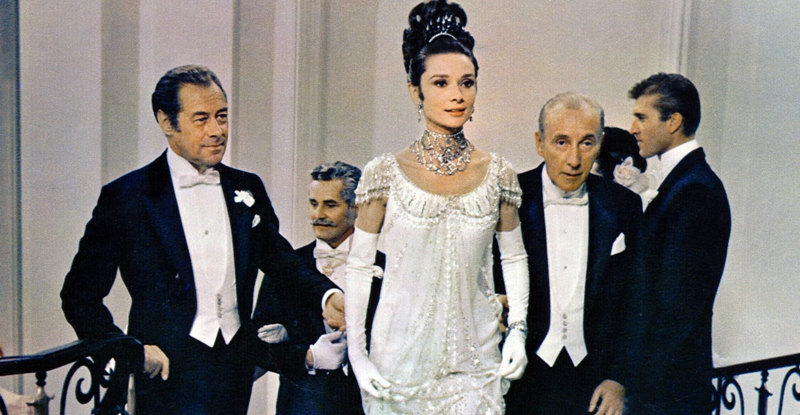Whitney Houston shines in her most underrated film, a 1996 remake of “The Bishop’s Wife” directed by Penny Marshall (“A League of Their Own,” “Big”). If you check out the Internet Movie Database (imdb.com) you’ll see that it merited just a 5.1 from site visitors. But the key thing is that fewer than 6000 users voted. Most imdb titles are scored on the basis of at least 20,000 votes.
So why did this one get comparatively fewer votes and lousy marks? Beats me. I think it’s a solid 7 out of 10.
Let’s start with the effervescent Houston and her music. From the moment the film opens with Houston and the Georgia Mass Choir singing “Hold on, Help Is on the Way,” you know it’s going to be an uplifting, gospel-filled musical. Other songs include “I Believe in You and Me,” “Step by Step,” “Joy,” “I Go to the Rock,” “I Love the Lord,” “Somebody Bigger than You and Me,” “Joy to the World, “My Heart Is Calling,” and the touching “Who Would Imagine a King?,” featuring the children’s choir from the film. Houston is at her charismatic best. This is her church, and she’s completely at home with the music and the role of a minister’s wife who herself was the daughter of a minister.
But the church is in trouble. There wouldn’t be a movie if that weren’t the case. The boiler is on its last leg, the neighborhood is declining into gangs and crime, and no matter how hard he tries or how many hours he puts in, the Rev. Henry Biggs (Courtney B. Vance) can’t seem to make any real headway. It’s all a downward slide, and he doesn’t even recognize his biggest problem: he’s spending so much time ministering to others that he’s neglecting his wife, big time. So when he prays for help and man named Dudley (Denzel Washington) who died some 30 years ago and has been in line for the chance to go back to earth to pull a Clarence and earn his wings, literally falls onto the snow in the churchyard where the minister’s son and friend are playing (and makes one crazy, real snow angel), Dudley’s focus is on the preacher. After all, that’s who called—though the man of faith finds it impossible to believe that a flesh-and-blood angel would turn up on his doorstep offering help. BE GONE! he tells Dudley, who promptly goes behind his back and courts misunderstanding while charming the ladies of the church into thinking he’s been sent by the church to be Rev. Biggs’ assistant.
What complicates things and creates a triangle in this romantic comedy is that Dudley, who has missed the sensual pleasures of life and is clearly struck by the charismatic Julia Biggs, finds himself asked to substitute for the Rev. Biggs by taking her places he should have been, instead of attending to his congregation. The minister is still blind, but the chemistry between the two doesn’t go unnoticed. Her mother (Jenifer Lewis), a sarcastic chain-smoker who lives with them, can spot sparks because, we suspect, she’s been there herself.
Of course there’s a developer. In the 20th century—heck, probably since the Monroe Doctrine and Westward Expansion—the destroyer of culture, history, and the little people’s humble way of life has always been a real estate developer. Here he’s played by Gregory Hines, who, as Joe Hamilton, builds gigantic upscale communities that displace the indigent people living in the areas he buys up and demolishes. Joe grew up attending the church that Rev. Biggs took over when his wife’s father died, but he’s forgotten his roots. He’s the film’s Mr. Potter, who tries to get Biggs on his team. That’s predictable, just as we know that at some point infectious gospel music will lap against his consciousness, even as it defies nonbelievers to sit there in apathy.
The music, the chemistry between Houston and Washington, and minor characters that make us smile make this film worth watching—especially around Christmas, when this is set. “The Preacher’s Wife” is one of my family’s favorite holiday movies for the very same reason that I could see some critics complaining. In adapting “The Bishop’s Wife,” Marshall opted to emphasize a mutual attraction between the two principles, rather than all-out love. Maybe she went that route because it’s more Christian. More likely it’s because it keeps the film light—and Marshall is like her brother Garry in preferring light entertainment to anything even remotely heavy. The church was never in any real danger, nor was anyone’s marriage. If you don’t mind toned-down narratives like that, “The Preacher’s Wife” is an entertaining film.
Video:
“The Preacher’s Wife” comes to home video via an AVC/MPEG-4 transfer. I saw no instances of excessive DNR and no artifacts—though I’ll admit it’s disappointing not to be able to make any puns about “haloing.” The 124-minute film looks sharp for the most part but inconsistent at times, lapsing into a soft look on occasion, with frames of heavy grain that seem to pass as quickly as they came. That leads me to believe the issues reside in the source materials. The film also isn’t as bright at times as it is others. Even so, colors and flesh tones are natural, and the level of detail we get at the 1080p level are certainly a step up from the DVD. The average person watching the movie and not looking for video issues will probably not notice anything amiss, apart from those occasional bouts of grain. “The Preacher’s Wife” is presented in 1.85:1 aspect ratio.
Audio:
The featured audio is an English DTS-HD MA 5.1 that offers a rich, full sound when the music is playing, but surprisingly little in the way of ambient sound otherwise. Dialogue is clear, but sometimes the center channel seems not as heavily prioritized as it could be. Otherwise, it’s a solid audio presentation. Subtitles are in English SDH and Spanish.
Extras:
One behind-the-scenes featurette is all you get, people. And it just whisks by, lighter than the movie itself.
Bottom line:
Forget the imdb score. The New York Daily Newscalled “The Preacher’s Wife” a “true crowd-pleaser,” and I’m inclined to agree. As always, it depends on the crowd. But I suspect you know who you are.


